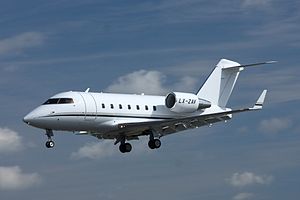Bombardier Challenger 605
| Challenger 600/601/604/605/650 | |
|---|---|
 |
|
|
|
|
| Role | Business jet |
| Manufacturer | Bombardier Aerospace |
| First flight | 8 November 1978 |
| Status | Active In production |
| Produced | 1978–present |
| Number built | 1000 (as of Nov 2015) |
| Unit cost |
650: US$32.35 millionUS (2015)
|
| Developed into | CRJ-100/200 |
The Bombardier Challenger 600 series is a family of business jets. It was first produced by Canadair as an independent company and then produced from 1986 by Canadair as a division of Bombardier Aerospace. Including the Challenger 300 and Challenger 850, 1,600 Bombardier Challengers are in-service, the fleet has logged 7.3 million hours over 4.3 million flights.
The origin of the Challenger 600 lies in Canadair’s purchase of a concept for a business jet aircraft, the LearStar 600 from the American inventor and aircraft developer Bill Lear. However, Lear had practically no influence on the ensuing development and design of the aircraft. Even the name LearStar was not new to this concept, since Lear had long before used the name for his conversion of Lockheed Lodestars into business transports. Thus, Canadair quickly abandoned the name LearStar and adopted the name Challenger.
Canadair's top management was of the opinion that Lear’s concept was sketchy at best. Lear did not have an expert grasp of aeronautical engineering. He was also at a financial low point, with a skeleton staff. Thus, he had only been able to pay a California aeronautical consultant to do some very preliminary design explorations.
However, Canadair planned to use Lear’s name and skills at self-promotion to secure extensive financial guarantees for a business jet project from the Canadian Federal government. This proved an effective choice. In Challenger: An Industrial Romance , the 1980 The National Film Board of Canada documentary on the development of the aircraft, future Prime Minister Jean Chrétien specifically refers to the effect of personal contact with Lear (on Chrétien’s decision to direct financial support to Canadair’s program).
At the time of these events, Chrétien was successively President of the Treasury Board, Minister of Industry, Trade and Commerce, and Minister of Finance, in the Canadian Federal government. Due to the use of letters of comfort, the extent of the Ministry's financial commitments for Canadair could be kept from parliament and the public for several years. These financial guarantees were later used as an academic example of insufficient monitoring and lax controls in government support of industry.
...
Wikipedia
